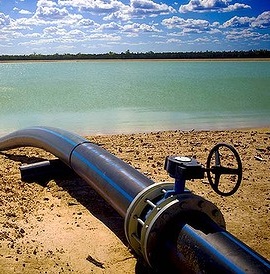Climate leader speaks against gas
 Tim Flannery has warned against investing in “dying” fossil fuel industries.
Tim Flannery has warned against investing in “dying” fossil fuel industries.
Professor Flannery, the former chief commissioner of the now defunct Climate Commission and former Australian of the Year, says investing in gas infrastructure or fracking in the Northern Territory would cost both economically and environmentally.
“There is no conflict between going renewable and economic development; what we do have is an industry that is determined to hang onto life,” Professor Flannery said.
“That's one of the old fossil fuel industries, it's fading out and it's fighting desperately to [hang onto life], and I think to put your money into a dying industry is the wrong thing to do.
“The problem gas faces is that the competition from renewables is just getting fiercer and fiercer, and we're already at the point where wind and solar are cheaper as an energy source than gas.”
The NT has a moratorium on fracking, and Professor Flannery says it is not worth removing it.
“We see what it’s done further south, we know what the dangers are, you see the impacts on pastoralists, and we know it's just not worth it,” he said.
“And why would you do it when we have clean energy sources that can do the same job cheaper? That's the question the Northern Territory Government has to answer.”
Professor Flannery said the answer is above the ground, not below it.
“There are much better ways to harvest your energy … the energy coming out of the sky is effectively endless, you can do anything you want with it,” he said.
“You just need a government that's going to lead and give you investment that will allow you to take advantage of your greatest asset, the Sun.”
Professor Flannery spoke specifically about the planned $800 million Jemena Northern Gas Pipeline project, set to connect the remote NT gas networks and allow access to east coast export facilities.
“My suspicion is that this is really a stalking horse for a much bigger project, and you're going to have to have more gas flow through the pipeline to make it really profitable, where's that gas going to come from? Well, if you manage to force some fracking, then you'll have some extra gas,” he said.
“If I was in politics up here, I'd be saying; ‘Let's have a look at the whole solar option, let's look at what the opportunities up here are’.
“Do what South Australia did with wind, build a whole export industry based on a clean base.
“It's very clear now where the economics are telling us to go, we know where the opportunities are, we know what young people are interested in, where all the smart people are going — it's a clean energy technology.
“How many young people do you know who are entering the coal industry today?”








 Print
Print